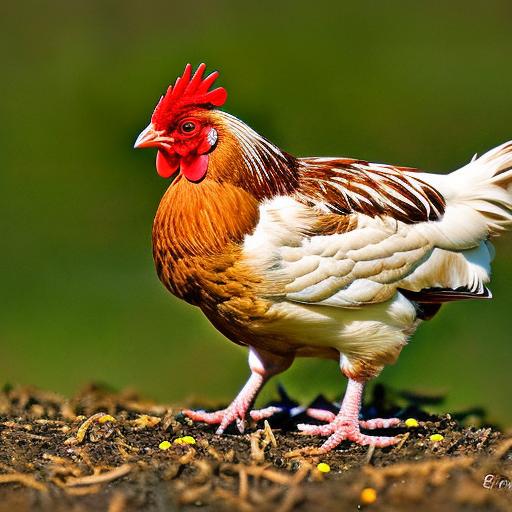Raising chickens in a suburban setting has become increasingly popular in recent years. Many people are discovering the benefits of having their own backyard flock, from the fresh eggs they provide to the joy of watching them roam and forage in the yard. In this article, we will explore the various aspects of raising chickens in a suburban setting, including understanding the regulations, choosing the right breeds, designing a coop and run, feeding and caring for your chickens, managing noise and odor concerns with neighbors, ensuring the safety and security of your flock, building community support, selling eggs and other products, and embracing the sustainable lifestyle of urban homesteading.
Key Takeaways
- Understand the regulations of your subdivision before raising chickens.
- Raising chickens in an acres subdivision has many benefits.
- Choose the right breeds for your suburban flock.
- Design a coop and run that suits your chickens’ needs.
- Feed and care for your chickens properly in a suburban setting.
Understanding the Regulations of Your Subdivision
Before you embark on raising chickens in a suburban setting, it is crucial to understand the regulations in your area. Many subdivisions have specific rules regarding keeping livestock, including chickens. Some may have restrictions on the number of chickens you can have or require certain setbacks from property lines. It is important to research and understand these regulations to ensure that you are in compliance and avoid any potential conflicts with your neighbors or local authorities.
To understand the regulations in your subdivision, start by checking your homeowner’s association (HOA) rules or any other governing documents that may outline restrictions on keeping chickens. If there are no specific rules mentioned, contact your local zoning department or animal control office to inquire about any ordinances or regulations that may apply. It is also helpful to reach out to other chicken keepers in your area to see if they have encountered any issues or have any advice on navigating the regulations.
Benefits of Raising Chickens in a Suburban Setting
There are numerous benefits to raising chickens in a suburban setting. First and foremost, having your own flock allows you to have a constant supply of fresh eggs. Not only are these eggs delicious and nutritious, but they also provide a sense of self-sufficiency and reduce reliance on store-bought eggs. Additionally, raising chickens can be a great educational experience for children and adults alike, teaching them about responsibility, animal care, and the cycle of life.
Raising chickens in a suburban setting also has environmental benefits. Chickens are excellent at reducing food waste by consuming kitchen scraps and turning them into nutrient-rich compost. They also help control pests in the yard by eating insects and other small creatures. Furthermore, chickens produce high-quality fertilizer that can be used to nourish plants and gardens, reducing the need for chemical fertilizers.
Choosing the Right Breeds for Your Suburban Flock
When it comes to choosing the right breeds for your suburban flock, there are a few factors to consider. First, you will want to choose breeds that are known for their docile temperament and adaptability to different climates. This is especially important in a suburban setting where your chickens may be exposed to various environmental conditions and interactions with neighbors.
Some popular breeds for suburban flocks include the Rhode Island Red, Australorp, Sussex, and Orpington. These breeds are known for their friendly nature, good egg production, and ability to handle confinement well. It is also important to consider the size of the breed, as smaller breeds may be more suitable for smaller yards or limited space.
Designing a Coop and Run for Your Chickens
Having a well-designed coop and run is essential for the health and safety of your suburban flock. The coop should provide adequate space for your chickens to roost, nest, and move around comfortably. It should also have proper ventilation to prevent moisture buildup and ensure good air quality. The run should be securely fenced to keep predators out and provide a safe outdoor space for your chickens to exercise and forage.
When designing your coop and run, consider the size of your flock and the available space in your yard. The general rule of thumb is to allow at least 4 square feet of coop space per chicken and 10 square feet of run space per chicken. However, more space is always better, especially if your chickens will be confined to the coop and run for extended periods.
Feeding and Caring for Your Chickens in a Suburban Setting

Proper feeding and care are essential for the health and well-being of your suburban flock. Chickens require a balanced diet that includes a combination of commercial feed, kitchen scraps, and foraged greens. It is important to provide them with a high-quality layer feed that is specifically formulated to meet their nutritional needs.
In addition to feed, chickens also require access to fresh water at all times. Make sure to clean and refill their waterers regularly to prevent contamination and ensure that they stay hydrated. It is also important to provide them with a dust bath area where they can clean themselves and control parasites.
Managing Noise and Odor Concerns with Your Neighbors
One of the main concerns that neighbors may have with backyard chickens is noise and odor. While chickens are generally not as noisy as other types of livestock, roosters can be quite vocal, especially in the early morning hours. If you live in a subdivision where roosters are not allowed, make sure to choose only hens for your flock.
To manage odor concerns, it is important to keep the coop and run clean and well-maintained. Regularly remove soiled bedding and replace it with fresh bedding to prevent the buildup of ammonia and odors. Composting chicken manure can also help reduce odor by breaking down waste materials into nutrient-rich compost.
Ensuring the Safety and Security of Your Chickens
Keeping your suburban flock safe from predators is crucial for their well-being. Common predators that may pose a threat to chickens include raccoons, foxes, coyotes, dogs, and even neighborhood cats. To protect your chickens, make sure that the coop and run are securely fenced and have a roof or cover to prevent predators from gaining access.
It is also important to reinforce the coop and run with hardware cloth or wire mesh to prevent predators from digging under or squeezing through gaps. Regularly inspect the fencing and repair any damage or weak spots. Additionally, consider installing motion-activated lights or alarms to deter nocturnal predators.
Building Community Support for Backyard Chickens
Building community support for backyard chickens can help create a more positive environment for chicken keepers in suburban settings. Start by educating your neighbors about the benefits of raising chickens, such as the fresh eggs, reduced food waste, and natural pest control they provide. Offer to share eggs or invite them over for a visit to see your flock firsthand.
You can also consider organizing a neighborhood workshop or seminar on backyard chickens, where you can share your knowledge and experiences with others who may be interested in starting their own flocks. Encourage open communication and address any concerns or misconceptions that your neighbors may have. By building a supportive community, you can create a more harmonious environment for everyone.
Selling Eggs and Other Products from Your Suburban Flock
If you have a surplus of eggs or other products from your suburban flock, you may consider selling them. However, it is important to do so legally and safely. Check with your local health department or agricultural extension office to understand the regulations and requirements for selling eggs in your area.
In some cases, you may need to obtain a permit or license, undergo regular inspections, or follow specific labeling and packaging guidelines. It is also important to practice good food safety and hygiene practices when handling and selling eggs. Keep records of your sales and maintain proper storage and transportation conditions to ensure the safety and quality of your products.
Embracing the Sustainable Lifestyle of Urban Homesteading with Chickens
Raising chickens in a suburban setting is not just about having fresh eggs or reducing food waste. It is also about embracing a sustainable lifestyle and reconnecting with nature. By raising chickens, you are taking a step towards self-sufficiency and reducing your carbon footprint. You are also teaching your children and future generations about the importance of sustainable living and responsible animal care.
In addition to chickens, you may also consider other aspects of urban homesteading, such as growing your own vegetables, composting, or even keeping bees. By embracing the sustainable lifestyle of urban homesteading, you are not only benefiting yourself and your family but also contributing to a healthier and more resilient community.
Raising chickens in a suburban setting can be a rewarding and fulfilling experience. From the fresh eggs they provide to the environmental benefits they offer, backyard chickens have a lot to offer. By understanding the regulations in your area, choosing the right breeds, designing a suitable coop and run, providing proper care and nutrition, managing noise and odor concerns, ensuring the safety and security of your flock, building community support, selling products legally and safely, and embracing the sustainable lifestyle of urban homesteading, you can create a thriving suburban flock that brings joy and sustainability to your life. So why not start your own backyard chicken flock today?
If you’re considering keeping chickens in an acre subdivision, you’ll definitely want to check out this informative article on Poultry Wizard. It discusses the benefits of using an A-frame chicken coop, which is a space-saving and efficient option for smaller properties. The article also provides valuable insights on choosing the right flooring for your chicken coop, ensuring a clean and comfortable environment for your feathered friends. For those specifically located in Muskegon, there’s even a dedicated article on building a chicken coop tailored to the local climate and regulations. To learn more about these topics and get expert advice, visit Poultry Wizard’s articles on A-frame chicken coops, chicken coop flooring, and Muskegon-specific chicken coops.
FAQs
What is an acres subdivision?
An acres subdivision is a type of residential development where each lot is typically one acre or larger in size.
Can you keep chickens in an acres subdivision?
It depends on the specific rules and regulations of the subdivision. Some subdivisions may allow chickens, while others may prohibit them.
What are some common rules regarding keeping chickens in subdivisions?
Common rules may include limits on the number of chickens allowed, requirements for coops and fencing, and restrictions on noise and odor.
What are the benefits of keeping chickens in a subdivision?
Keeping chickens can provide a source of fresh eggs, fertilizer for gardens, and entertainment for families. It can also promote sustainable living and self-sufficiency.
What are some potential drawbacks of keeping chickens in a subdivision?
Potential drawbacks may include noise and odor complaints from neighbors, increased risk of predators, and the responsibility of caring for the chickens.
What should you do if you want to keep chickens in an acres subdivision?
You should first check the rules and regulations of the subdivision to see if chickens are allowed. If they are, you should follow all guidelines and requirements for keeping chickens, including proper housing and care. If they are not allowed, you may need to seek permission from the homeowners association or local government.
Meet Walter, the feathered-friend fanatic of Florida! Nestled in the sunshine state, Walter struts through life with his feathered companions, clucking his way to happiness. With a coop that’s fancier than a five-star hotel, he’s the Don Juan of the chicken world. When he’s not teaching his hens to do the cha-cha, you’ll find him in a heated debate with his prized rooster, Sir Clucks-a-Lot. Walter’s poultry passion is no yolk; he’s the sunny-side-up guy you never knew you needed in your flock of friends!







